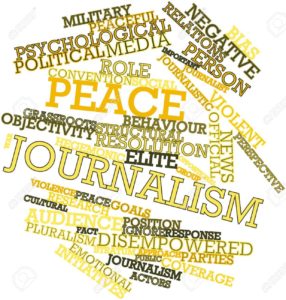Peace Journalism
EDITORIAL, TMS PEACE JOURNALISM, 8 Apr 2019
René Wadlow – TRANSCEND Media Service
Peace Journalism: Our task is to promote inclusion in negotiations held in good faith.
Peace journalism has two primary tasks: to make creative proposals for the settlement of conflicts and to work for broad inclusion of parties for negotiations held in good faith. Our first task is creativity because those involved in armed conflicts usually focus on narrow possibilities and options.
In practice “all options are not on the table”. There is usually in the minds of the chief protagonists a rather narrow set of options, of which “kill them” is high on the list.
As George Russell writing under the pen name of A.E. wrote in The Peacemakers,
“Ares is the only god who repeats himself. The warrior mind in heaven as on earth is devoid of imagination. Was there ever clearer evidence of flagging invention than in the Russian revolution following the French? The dramatis personae are the same in both dramas, a half-witted king, a haughty queen, angry philosophers, magicians, charlatans, ferocious dictators, and peasant wars?”
Thus, a chief task is to present a broader set of options, creative forms of cooperation that do not come first to mind. The presentation of possible but not obvious options was one of the strengths of Jean Monnet working for French-German reconciliation and more broadly for an integration of Western European States as a way of preventing war. (1)
The second task is to promote inclusion of as many relevant actors in negotiations as possible. A key example is currently underway. After decades of conflict, the idea that negotiations concerning the conflicts in Afghanistan could be useful has dawned in the minds of government leaders. The idea might have dawned earlier, but let us not be critical. There are two sets of negotiations somewhat underway. The more broadly-based one is led by the Russian Foreign Ministry, named the Moscow Format. These negotiations which began in Moscow 5-6 February 2019 hopefully will continue. The Russians, wise from the Soviet experience, are aware that the conflicts in Afghanistan have an impact on neighboring countries such as Pakistan, China, Iran, India, and Central Asia. Thus representatives from these countries were in the Moscow meeting. However, the current Afghan government and the USA were not party to these Moscow discussions.
The second set of Afghan discussions – basically negotiations about how to organize negotiations – are being held between representatives of the U.S. Government and the Taliban located at in their mission in Qatar. Obviously, discussion among people with guns in their hands is necessary. After many years of armed conflict it is not a radical idea and would probably been undertaken even without peace journalists.
Our task, it seems to me, is to point out that the Taliban, the U.S. Government, and even the current Afghan Government are not the only players. There are others with guns in their hands, though in the Afghan context, they may control only one valley. The Taliban is not a centralized, coherent body, but rather a name for a fairly wide spectrum of armed groups “on the ground”. In addition, there are armed groups which do not identify themselves as Taliban.
Moreover, since they may be easily overlooked, there are groups of people who do not have guns in their hands. These voices merit being heard. A first task of peace journalists is to point out that such people exist. Since these voices are rarely taken into consideration, a possible peace task is to help them articulate their views and then make them better known through articles.
What is true for these potential Afghan negotiations is also true for a good number of other armed conflicts. There are voices which are not heard because they do not have avenues of communication to government decision-makers. Also these voices rarely receive attention from the more general media. Thus Peace Journalists need to work so that all voices can be heard. Inclusiveness may not make negotiations easier. But neglected voices may become “spoilers” undermining what negotiated compromises have been able to accomplish. Negotiations are a “window of opportunities”. Our task as peace journalists is to keep the window open.
Note:
1) For a good biography see: Pascal Fontaine. Jean Monnet -L’Inspirateur (Paris: Jacques Grancher, 1988)
______________________________________
 René Wadlow is a member of the TRANSCEND Network for Peace Development Environment. He is President of the Association of World Citizens, an international peace organization with consultative status with ECOSOC, the United Nations organ facilitating international cooperation and problem-solving in economic and social issues, and editor of Transnational Perspectives.
René Wadlow is a member of the TRANSCEND Network for Peace Development Environment. He is President of the Association of World Citizens, an international peace organization with consultative status with ECOSOC, the United Nations organ facilitating international cooperation and problem-solving in economic and social issues, and editor of Transnational Perspectives.
Tags: Conflict Resolution, Conflict Transformation, Journalism, Media, Nonviolence, Peace Journalism, Solutions
This article originally appeared on Transcend Media Service (TMS) on 8 Apr 2019.
Anticopyright: Editorials and articles originated on TMS may be freely reprinted, disseminated, translated and used as background material, provided an acknowledgement and link to the source, TMS: Peace Journalism, is included. Thank you.
If you enjoyed this article, please donate to TMS to join the growing list of TMS Supporters.

This work is licensed under a CC BY-NC 4.0 License.
Read more
Click here to go to the current weekly digest or pick another article:
EDITORIAL:
- Innovation without Wisdom Is like Life without Love
- Detained by Canada: A Puzzling Experience
- After the US Empire: A World of Regions?
TMS PEACE JOURNALISM:
